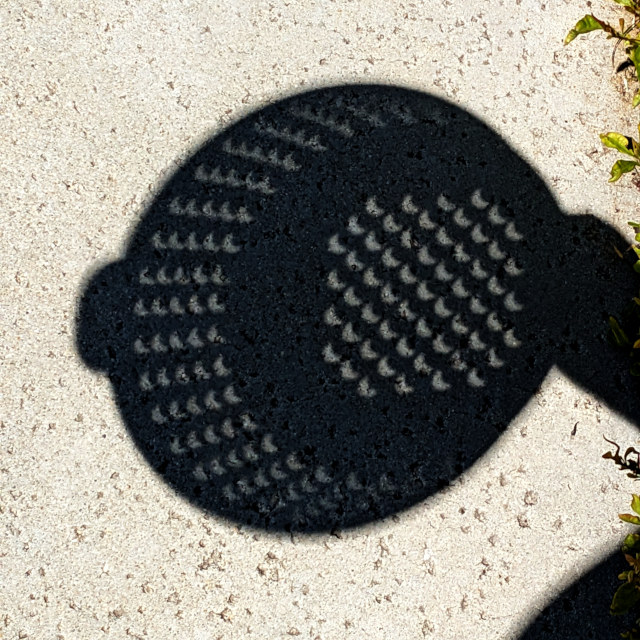For a lot of reasons, we didn’t arrange another road trip to see today’s total eclipse like we did in 2017 (which was amazing, by the way!). It was only partial out here in California, and not even with as high a magnitude as the one last October.
But we had clear skies, so we broke out the eclipse glasses from 2017 again. After testing them first by looking directly as a bright indoor lamp to make sure there were no scratches. And I’d heard that colanders make interesting patterns (each hole works as a pinhole camera) much like overlapping leaves do, so I brought that out — as you can see, it worked quite well!
I do kind of regret not being able to get out to see this one as total. Partial eclipses can be really cool, especially if you have multiple ways to observe them, but XKCD has a point. There really isn’t any comparison to experiencing totality, and it doesn’t come through very well in photos.
I bet northern Spain is already booked for 2026.
It is interesting to think that solar eclipses happen every year — usually twice! — but they’re not always total, and they’re only visible from a small part of the planet at a time. And sometimes that’s a slice of, say, Antarctica or Siberia or out in the middle of the ocean. Not rare for the planet, but definitely rare for any given location.
On one hand, it’s no wonder people used to see them as omens. With travel and communication slow (and in many cases impossible) in the ancient world, if you’re only going on what’s been seen in your area, it seems super-rare and unpredictable. On the other hand, cultures with sophisticated enough astronomy like the ancient Babylonians were able to calculate the eclipse cycle thousands of years ago!
One bit of funny timing: We’ve been catching up on the last season of The Magicians. Today we got up to an episode that…well, let’s just say the moon figures very prominently in it!
Update: Axios posted a nice map last week showing how fully booked AirBnBs are for the day in different parts of the US…which shows the path of totality *very* clearly!
